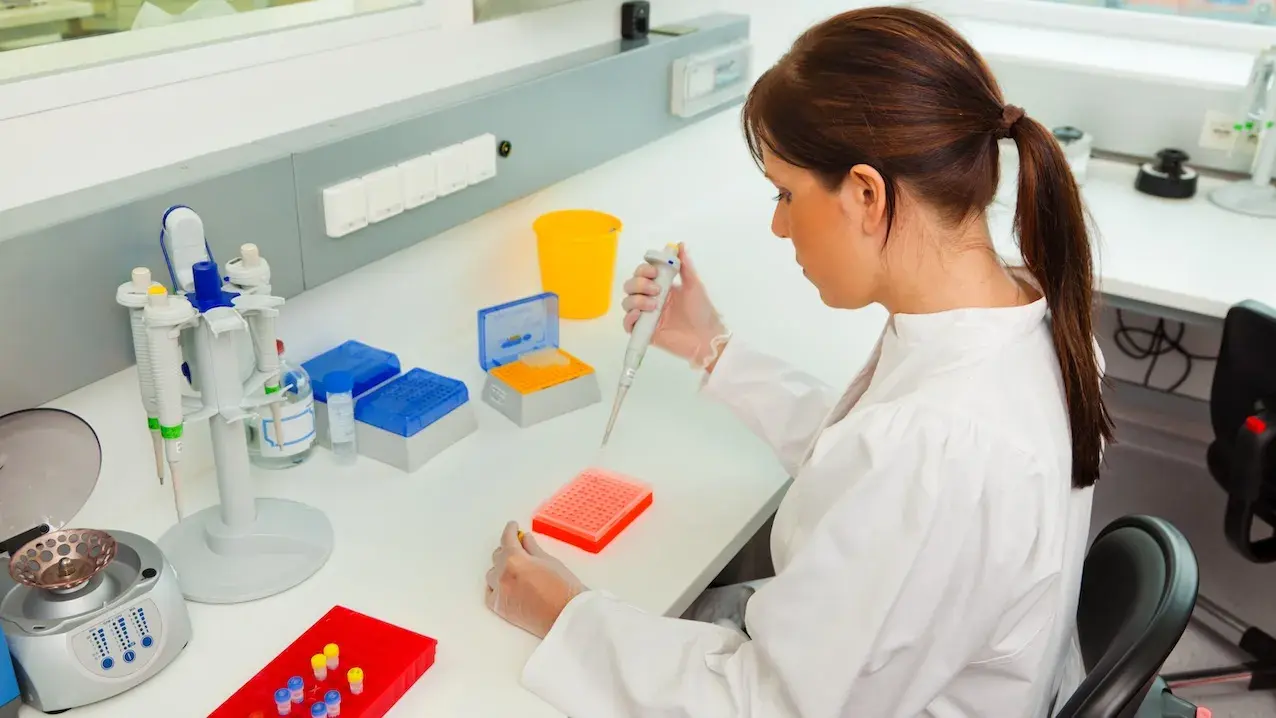Section Molecular Biology and Biochemistry

«Proteins involved in DNA replication and DNA repair are interesting targets in cancer therapy and can be used as diagnostic tools.»
Dr. Kerstin Gari, Co-Lead of Molecular Biology and Biochemistry Group

«The antibiotic resistance crisis is one of the biggest problems of our time. Molecular biology offers solutions such as the development of novel antibacterial agents.»
PD Dr. Mathias Schmelcher, Co-Lead Molecular biology and Biochemistry Group
Our group conducts application-oriented research in the fields of molecular biology and biochemistry. We have many years of expertise in the fields of antibiotic resistance and antimicrobial agents, characterization of microorganisms, cancer research and protein engineering.
We offer lectures and practical courses in the fields of biology, microbiology, molecular biology and biochemistry in the BSc Biotechnology and Chemistry programs and the MSc Pharmaceutical Biotechnology program.
We also supervise students in their Minor, BSc and MSc theses.
About us
The aim of the Molecular Biology and Biochemistry Group is to develop new therapeutics and tools for diagnostics and to identify new molecular targets for drugs.
One focus is on DNA replication and DNA repair proteins, as these represent interesting targets in cancer therapy and can also be used as tools in diagnostics and bioanalytics.
Another focus is on the development of novel antimicrobial agents, including those based on bacteriophage proteins, in order to counteract the current antibiotic resistance problem.
Competencies
The Molecular Biology and Biochemistry Group offers know-how for applied R&D projects in the following areas:
- Cloning and production of recombinant proteins in E. coli, yeast cells, insect cells, CHO and HEK cells
- Purification and functional characterization of proteins
- Protein engineering
- Development of in vitro assays
- Antimicrobial agents
- Identification and characterization of microorganisms
- qPCR-based analyses
- Production of stable cell lines and knockout cell lines
- Cell viability tests
Main areas of research
DNA repair proteins as targets in cancer therapy
The genome of cancer cells is typically unstable and characterized by mutations. In order to continue dividing, cancer cells often switch off certain DNA repair pathways and become dependent on alternative (usually error-prone) DNA repair pathways. This dependency can be exploited in targeted cancer treatment. Our aim is to identify suitable therapeutic targets among the multitude of DNA repair proteins and to develop specific inhibitors.
For more information please contact Kerstin Gari.
Isothermal DNA amplification methods
Point-of-care tests play an important role in developing countries and structurally weak areas, as they enable rapid diagnostics without laboratory infrastructure and trained medical personnel. In recent years, various isothermal DNA amplification methods have been developed for the detection of pathogenic DNA, which can be used to amplify DNA with minimal equipment. In contrast to the PCR method, isothermal DNA amplification methods are carried out at a constant temperature and therefore do not require any equipment other than a thermoblock or water bath. In many cases, however, isothermal amplification methods are still inferior to classical PCR. The aim of our research is to develop diagnostic tests based on the isothermal amplification of pathogenic DNA.
For more information please contact Kerstin Gari.
Antimicrobial proteins
In order to counteract the increasing resistance of pathogenic bacteria to conventional antibiotics, the discovery and development of new antimicrobial agents with novel mechanisms of action is of enormous importance. Certain antimicrobial proteins such as cell wall-degrading enzymes (peptidoglycan hydrolases, PGHs) represent a promising approach. Endolysins are PGHs from bacteriophages that are characterized by high efficacy and specificity towards their target bacteria, activity against antibiotic-resistant strains, biofilms and persister cells, as well as low susceptibility to resistance development. Our research aims at the development and characterization of such protein-based antimicrobial agents. Through protein engineering, components of different origins can be combined within novel modular proteins to achieve improved properties or new functions. In this way, we aim to meet challenges in various fields of application such as human therapy, diagnostics, agriculture or food safety.
For more information please contact Mathias Schmelcher.
Efficacy testing of antimicrobial processes
New processes or substances intended to inactivate microorganisms must be tested for effectiveness. This requires standardized testing procedures to enable proper assessment. For some substances and methods, these procedures may need to be adapted or, if necessary, newly developed. Testing involves various organisms, including bacteriophages, bacteria, fungi, and antibiotic-resistant strains like MRSA.
Our goal is to quickly and reliably test the effectiveness of new antimicrobial agents or methods using these procedures.
For more information, please contact Gottfried Dasen.
Teaching
We offer attractive and application-oriented teaching in the fields of molecular biology, biochemistry and microbiology with lectures and practical courses in the Bachelor's and Master's degree programs. Practical work such as BSc and MSc theses often take place in collaboration with academic or industrial partners.





